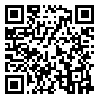BibTeX | RIS | EndNote | Medlars | ProCite | Reference Manager | RefWorks
Send citation to:
URL: http://jhr.ssu.ac.ir/article-1-797-fa.html
Background: Internet addiction can affect students' general health. Regarding to the importance of healthy eating and the impact on health and academic achievement of students. This research was conducted to aim the assessment of relationship between internet addiction and dietary behavior among students.
Methods: In this an analytical cross-sectional study, 373 nursing and midwifery students of Tehran University of Medical Sciences participated in 2020. Data were collected by Young's Internet Addiction Scale, demographic data and Dietary Behavior questionnaire. Data analyzed by SPSS V.21 and descriptive indicators including frequency, percentage, and inferential tests including chi-square test. A significance level of less than 0.05 was considered.
Results: The majority of the student population had no internet addiction by 91.4%. Also, 8.3% and 0.3% from student population were potential risk and high risk respectively. There was a statistical significant correlation between levels of internet addiction and dietary behavior in high-fat diets (r = 0.483, P = 0.004), snacking (r = 0.455, P > 0.001), emotional eating behavior (r = 0.543, P > 0.001) and poor dietary pattern (r = 0.632; P < 0.001).
Conclusions: It is suggested to improve students' beneficial use of the internet with training and improve their dietary behavior.
| بازنشر اطلاعات | |
 |
این مقاله تحت شرایط Creative Commons Attribution 4.0 International License قابل بازنشر است. |



